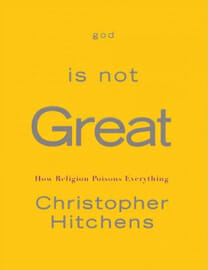Christopher Hitchens: God is Not Great

Friends and family of the heroic passengers on United 93 may be surprised to find out the Islamic terrorists who hijacked the flight on 9/11 were “the most sincere believers” on the plane. This nugget comes from our crusty media star Christopher Hitchens’ new book, which is certain to generate controversy.
Out of context, Hitchens’ assertion about the terrorists may appear inappropriate, if not treasonous, but he’s using the word “believers” as a pejorative, and in this sense, he’s preaching to his choir. His fellow materialists will love the play on words. We believers, though, whom he refers to elsewhere as “yokels,” “credulous idiots” and “stupefied peasants,” may wonder why we picked up the book in the first place.
We picked it up because, despite its grandiose title, it promised to offer a thoughtful critique of organized religion. Given the rise of Islamic fascism; the disgrace within the Roman Catholic Church; the recalcitrance of fundamentalist Jewish settlers on the West Bank; and the brutal hostility of some American protestant sects toward women, gays and anybody else who dares question their authority—in light of all this, the book seemed right for our time.
But as learned and well-researched as it is, God is Not Great merely offers a fleeting critique of what we think of as organized religion. At its center lies a broader attack against those who, religious or not, believe in the life of the spirit as well as the life of the flesh. In short, Hitchens has written a hymn of praise to scientific materialism and, sad to note, a clumsy apology for its own many crimes.
“Religion Kills,” Hitchens titles a chapter with typical bravado, as though science doesn’t. The history of scientific inquiry is filled with examples of incompetence, chicanery and outright torture and homicide undertaken in the name of “reason” and “progress.” Yet Hitchens continues to imply that evil is the prefecture of religion rather than a resident of both secular and spiritual worlds.
In one telling passage, Hitchens offers the tentative conclusion that religion is “not only amoral, but immoral.” Using child abuse as an example, he writes: “The ignorant psychopath or brute who mistreats his children must be punished but can be understood. Those who claim a heavenly warrant for the cruelty have been tainted by evil.”
What then of the National Socialist scientists who conducted experiments on Jewish children in Hitler’s death camps? Clearly psychopaths and brutes, they did not claim “a heavenly warrant” for the cruelty they inflicted. Should they, too, have been “understood” since they were not committing their crimes in the name of God, but in the name of science?
When Hitchens recites the horrendous persecutions inflicted on authority of the Church of Rome, he often leaves the impression that these were mostly crimes committed by believers against unbelievers, but history is rarely so neat.
The Anabaptists in 16th-century Antwerp were themselves believers in a just and loving God, but they were nonetheless burned at the stake, buried alive, drowned, eviscerated and hanged simply because they refused to baptize infants (their logic being that baptism should be reserved for professing believers who had attained the age of reason).
-

-

-

-

-

-

-

-

-

-

-

-

-

-

-

-

-

-

-

-

-

-

-

-

-

-

-

-

-

-

-

-

-

-

-

-

-

-

-

-








































